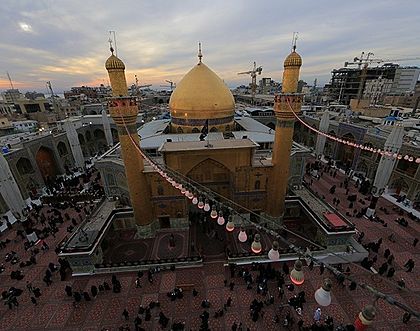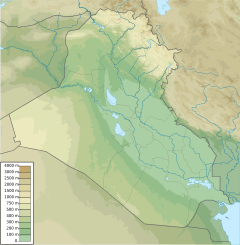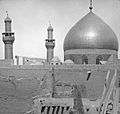Imam Ali Mosque facts for kids
Quick facts for kids Sanctuary of Imam Ali |
|
|---|---|

Imam Ali Mosque, where the first Shi'ite Imam Ali ibn Abu Talib is buried
|
|
| Religion | |
| Affiliation | Islam |
| Rite | Shi'ite |
| Ecclesiastical or organizational status | Mosque and Shrine |
| Status | Built |
| Location | |
| Location | Najaf, Iraq |
| Architecture | |
| Completed | 977 CE |
| Specifications | |
| Dome(s) | 1 |
| Dome height (inner) | 42 metres (138 ft) |
| Minaret(s) | 2 |
| Minaret height | 38 metres (125 ft) |
| Shrine(s) | 1 |
The Imām ‘Alī Holy Shrine (Arabic: حرم الإمام علي), also known as Masjid Ali or the Mosque of ‘Alī, is a very important mosque and shrine in Najaf, Iraq. It is a special place for millions of Shi'ite Muslims around the world. This shrine is believed to be the burial place of Ali ibn Abi Talib, who was a cousin and son-in-law of the Islamic prophet Muhammad. He is also considered the first Imam (leader) by Shi'ite Muslims.
Contents
What is the Imam Ali Holy Shrine?
The Imam Ali Holy Shrine is more than just a mosque. It is a large complex that includes a beautiful golden dome, tall minarets, and many decorated halls. It serves as a place of worship, a center for religious learning, and a pilgrimage site. People visit from all over the world to show their respect and pray.
Who was Imam Ali?
Ali ibn Abi Talib was a very important figure in Islamic history. He was a close companion of Prophet Muhammad and became the fourth Caliph (leader) of the Muslim community. Shi'ite Muslims believe he was the rightful spiritual and political successor to Prophet Muhammad. His teachings and actions are highly respected and followed.
Why is Najaf important?
The city of Najaf is one of the holiest cities in Shia Islam. It is often called the "City of Ali" because of the shrine. Many scholars and religious leaders have lived and studied here. The city also has a large cemetery, one of the biggest in the world, where many Muslims wish to be buried.
History of the Shrine
The history of the Imam Ali Holy Shrine goes back many centuries. The first building over Imam Ali's grave was built a long time ago. Over time, different rulers and leaders added to and rebuilt the shrine. This was often done to make it grander and more beautiful.
Early Buildings
The first simple structure was built shortly after Imam Ali's death. Later, during the 8th century, a more formal building was constructed. This early shrine was often damaged or destroyed due to conflicts. However, it was always rebuilt by devoted followers.
Golden Age of Construction
A major reconstruction happened in 977 CE, which is considered a significant year for the shrine. Many different dynasties, like the Buyids and the Safavids, contributed to its design. They added the beautiful decorations, golden domes, and minarets we see today. The shrine's inner dome is about 42 meters (138 feet) high. Its two minarets are about 38 meters (125 feet) tall.
Modern Era and Renovations
Even in recent times, the shrine has undergone renovations. These updates help preserve its beauty and structure. They also ensure it can welcome the millions of pilgrims who visit every year. The shrine remains a symbol of faith and devotion.
Architecture and Design
The Imam Ali Holy Shrine is famous for its stunning Islamic architecture. It shows a mix of different styles from various periods. The most striking features are its golden dome and minarets.
Golden Dome and Minarets
The main dome is covered with thousands of gold-plated tiles. It shines brightly, especially when the sun hits it. The two tall minarets also have golden tops. These golden features make the shrine stand out and symbolize its importance.
Inside the Shrine
Inside, the shrine is richly decorated with mirrors, intricate tilework, and calligraphy. The central part is the Ḍarīẖ, a cage-like structure that covers the actual grave of Imam Ali. Pilgrims often touch or kiss the Ḍarīẖ as a sign of respect. The atmosphere inside is usually very peaceful and spiritual.
Pilgrimage and Traditions
Visiting the Imam Ali Holy Shrine is a deeply spiritual experience for many Muslims. Millions of people make the journey every year.
Pilgrimage Rituals
When pilgrims arrive, they usually perform certain rituals. These include walking around the shrine, offering prayers, and reciting verses from the Quran. Many also spend time reflecting and seeking blessings. The shrine is especially crowded during religious holidays like Arba'een.
Importance of Visiting
For Shi'ite Muslims, visiting the shrine is a way to connect with Imam Ali and his legacy. It is seen as an act of devotion and a source of spiritual reward. The shrine also serves as a place for people to gather, learn, and strengthen their faith.
Images for kids
-
During Arba'een in 2015
See also
 In Spanish: Mezquita del Imán Alí para niños
In Spanish: Mezquita del Imán Alí para niños
 | William M. Jackson |
 | Juan E. Gilbert |
 | Neil deGrasse Tyson |








